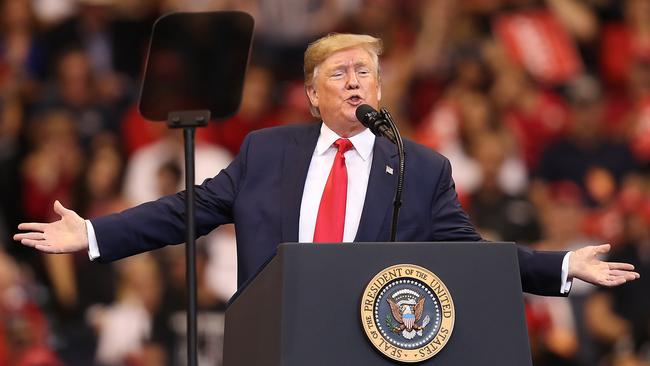
For politicians, last week’s vote should make one thing clear: parties of labour (the US Democrats, the Australian Labor Party and UK Labour) cannot continue to espouse job-destroying policies — especially in relation to mining. Working class voters just don’t care about the cultural issues that motivate wealthy elites in big cities.
Hillary Clinton’s deplorables — those who stuck with Donald Trump last week and the sort of people who voted last year for Scott Morrison or for Brexit in 2016 — may be poorly regarded by our ABC, The Guardian or The New York Times. Yet theirs are values that, until a decade ago, were supported by most parties which claim to represent workers.
One avid reader summed it up in an email on Thursday morning, railing against some of this newspaper’s headlines that day: “Why is it deplorable to be hardworking, God-fearing and patriotic? To believe in freedom of thought, speech and religion? To want a job to put food on the table for your family? To me it is the media that is deplorable.” Hard not to agree.
Fran Kelly on ABC RN Mornings on election day demonstrated the left media’s standard suspicion of ordinary voters. She was interviewing former Sydney Morning Herald political reporter Jonathan Swan, who is now US-based at Axios. Swan spoke of police concerns about the possibility of violence if Trump won. Responded Kelly: “But I thought the scenario that people were concerned about was that if Donald Trump actually didn’t win but claimed victory.”
Of course she did. Kelly does not see the violence of protests she supports, like that at Black Lives Matter rallies. Yet she fears ordinary mid-west Americans. Even on election night outside the White House the violence was by people who feared a Trump win.
Yet Swan was correct a week earlier when he reported Trump’s plans to try to discredit the election result if he was behind. The ABC has been in a tizz about it for days but most conservative media have refused to run with Trump’s unproven fraud claims. FoxNews in the US demanded Republicans provide proof. On Sky News here, Andrew Bolt, Chris Kenny and Paul Murray were cautious. Only Alan Jones was prepared to echo Trump’s lines. Trump’s behaviour should not surprise; he has always put personal interest ahead of the national interest.
Yet for all his faults, Trump has connected with middle America. Chris Kenny wrote here on Thursday morning: “Biden and the Democrats ran sanctimonious lines on issues of identity politics, on race, gender, immigration … They insult as bigots anyone who considers voting for the other side, then wonder why they do not woo them across.” Sky News reporter Annelise Nielsen, who has been in the US for three months, has done a superb job in regional America explaining how Republican voters feel. Many have said they feel threatened if they publicly support Trump.
Despite being misunderstood by big city media, many Republican supporters may not be too upset with the election result. Voters have removed a chaotic and narcissistic President, but almost half have still sent the president-elect a message that they don’t much care for the Democrats’ plans to abandon fossil fuels and introduce a Green New Deal.
In fact the result is so close Biden will not be able to claim a mandate for radical change, especially if the Republicans retain the Senate and win several extra seats in the House. On the conservative principle that resisting concentration of political power minimises political adventurism, the result seems to have pleased Wall Street, which believes Biden will not be able to get proposed tax increases passed. Good.
As The Australian Financial Review’s Jacob Greber wrote on Thursday of Democrats who had tried to turn the election into a referendum on Trump’s handling of coronavirus, “Turns out it was also a referendum on their plans to remake the country to their liking, and enough middle-of-the-road voters in places where the country’s agenda-setting media don’t live just weren’t convinced.”
Journalists should not be surprised half the country ranked Trump’s economic performance highly even if 230,000 Americans have died of COVID-19 on his watch. As this column has pointed out many times, Trump had fired up the US economy for three years before the pandemic. The stockmarket had been at an all-time high, unemployment at near record lows, wages were growing and African American unemployment was at its lowest levels since World War Two. Why wouldn’t working people be happy? And of course most don’t like the BLM violence sanctioned by Democrat mayors and state governors in some of the country’s largest cities.
Then there is the cynical way the media reports the pandemic. This column has argued since March that COVID-19 is not particularly dangerous, except to the elderly with comorbidities. US death rates per million are similar to those in France, Britain, Italy and Spain, but the population of the US is six times that of the UK.
But where the media class really has a lot of soul-searching to do is in its treatment of the false allegations that Trump in 2016 colluded with Russia. While that story ran for the best part of four years, large sections of the media remained incurious this year about Joe Biden, his mental health and his son Hunter’s business dealings in Ukraine and China.
The New York Times, The Washington Post and CNN will have to start seriously examining Biden’s health and his family’s business interests if they are to restore their credibility. How can they accept Obama-era national security figures James Clapper and John Brennan branding the New York Post’s Hunter Biden emails story as Russian disinformation, when years of Brennan/Clapper allegations about Trump’s involvement with Russia have proven to be lies?
In The Wall Street Journal on Wednesday, Holman Jenkins discussed Russiagate, and Pulitzer Prize winner Glenn Greenwald’s resignation from The Intercept, the journal he helped found: “He and a few others, such as Matt Taibbi of Rolling Stone, spent recent years demonstrating the unweird proposition that a journalist can be both anti-Trump and anti-lies-about-Trump.” Not the snowflakes at The New York Times, though.
Just as important for editors wanting to rebuild credibility would be the axing of polling. The big poll averaging companies, RealClearPolitics and Nate Silver’s fivethirtyeight.com, predicted a Biden win by 7.2 and 8.4 points respectively. The result was three points.
Sydney University associate professor of political sociology Salvatore Babones, on Thursday in the SMH blamed pollsters’ inability to reach a representative sample via mobile phone. Most people, but especially the young, do not answer unknown callers. Without fixed phone lines or face-to-face polling, the business is broken and has misread two US elections, Brexit and the 2019 Australian federal election.








The US election has made a few things even clearer about modern media: polling is not worth paying for, progressive journalists don’t trust, understand or even like many of the people they serve, and voters generally get more right about politics than journalists do.